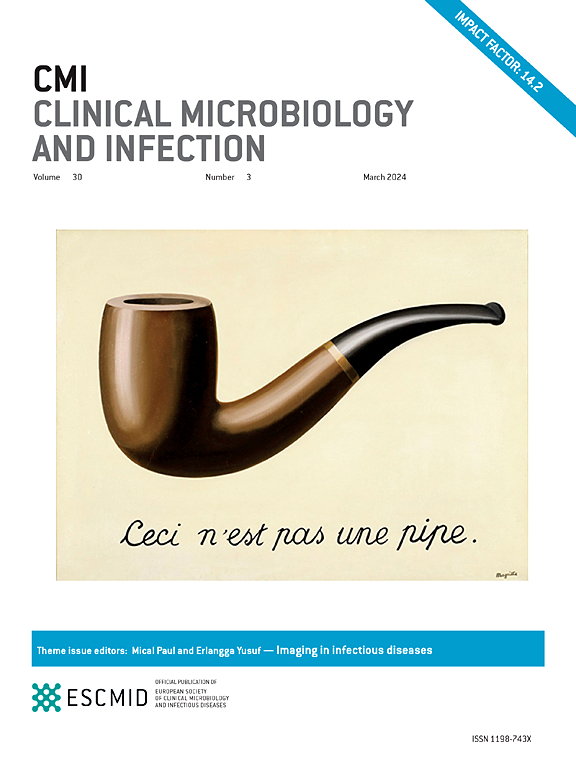德尔菲共识:弱势人群covid -19后病情的诊断和治疗管理。
IF 10.9
1区 医学
Q1 INFECTIOUS DISEASES
引用次数: 0
摘要
背景:对covid - 19后状况(PCC)的了解仍然很少,特别是在临床易感人群中。在ORCHESTRA项目中,我们应用德尔菲方法对HIV感染者(PWH)、风湿病(RD)和血液恶性肿瘤(HM)患者的PCC的诊断、管理和预防提出建议。方法:在文献回顾的基础上,确定了PWH、HM和RD中PCC的三个关注领域:1)特征和危险因素;2)诊断与管理;3)预防。共有69名专家参与,共进行了15个问题的德尔菲匿名调查。共识是通过6分李克特量表来衡量的,分为四个等级:强烈不同意、中度不同意、中度同意和强烈同意。就达成协商一致意见的问题发表了发言。结果:共生成11篇报告:6篇关于临床易感人群PCC的特征和危险因素,2篇关于诊断和管理,3篇关于预防。慢性疲劳被认为是PWH和RD人群中PCC最常见的表现。由于前列腺癌和自身免疫性疾病的症状可能重叠,因此RD人群需要对前列腺癌进行不同的病例定义。PCC的危险因素包括年龄在65岁以下、COVID-19的严重程度和女性;后者也与嗅觉/味觉障碍的增加有关。不建议在急性感染3个月后进行临床评估或常规实验室检查来诊断PWH患者的PCC。在新发慢性疲劳/关节痛的情况下,应筛查PWH和RD以排除其他自身免疫性疾病。应促进COVID-19全程疫苗接种和早期治疗,以预防PCC,而急性感染期间不建议使用皮质类固醇。结论:PCC的诊断、管理和预防仍有待探讨。这个德尔福提供了有价值的见解,PCC在选定的临床弱势群体,并建议在弱势群体量身定制的方法。本文章由计算机程序翻译,如有差异,请以英文原文为准。
ORCHESTRA Delphi consensus: diagnostic and therapeutic management of post-COVID-19 condition in vulnerable populations
Objectives
Post-COVID-19 condition (PCC) remains poorly understood, especially in clinically vulnerable groups. We applied the Delphi approach to drive recommendations for the diagnosis, management, and prevention of PCC in people living with HIV (PWH) and patients affected by rheumatological diseases (RD) and haematological malignancies.
Methods
On the basis of literature review, three areas of interest in PCC in PWH, haematological malignancies, and RD were identified: (a) features and risk factors; (b) diagnosis and management; and (c) prevention. A three-round Delphi anonymous survey consisting of 15 questions was conducted including 69 experts. Consensus was measured by the six-point Likert scale categorized into four tiers: strong disagreement, moderate disagreement, moderate agreement, and strong agreement. Statements were generated on questions achieving consensus.
Results
Eleven statements were generated: six on features and risk factors of PCC in clinically vulnerable populations, two on diagnosis and management, and three on prevention. Chronic fatigue was identified as the most frequent presentation of PCC in PWH and RD populations. A different case definition of PCC is required for RD population, as symptoms of PCC and autoimmune disorders may overlap. Risk factors for PCC include age >65, severity of COVID-19, and female sex; the latter is also associated with increased smell/taste impairment. A clinical assessment or a routine laboratory test performed 3 months after acute infection is not suggested to diagnose PCC in PWH. PWH and RD should be screened to exclude additional autoimmune disorders in case of chronic fatigue/arthralgia of new onset. Full-course vaccination and early treatment for COVID-19 should be promoted to prevent PCC, whereas corticosteroids during acute infection are not recommended.
Discussion
Diagnosis, management, and prevention of PCC are still under discussion. This Delphi offers valuable insights on PCC in selected clinically vulnerable populations and suggests a tailored approach in vulnerable populations.
求助全文
通过发布文献求助,成功后即可免费获取论文全文。
去求助
来源期刊
CiteScore
25.30
自引率
2.10%
发文量
441
审稿时长
2-4 weeks
期刊介绍:
Clinical Microbiology and Infection (CMI) is a monthly journal published by the European Society of Clinical Microbiology and Infectious Diseases. It focuses on peer-reviewed papers covering basic and applied research in microbiology, infectious diseases, virology, parasitology, immunology, and epidemiology as they relate to therapy and diagnostics.

 求助内容:
求助内容: 应助结果提醒方式:
应助结果提醒方式:


